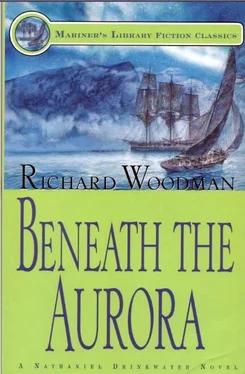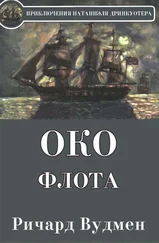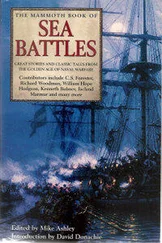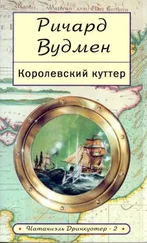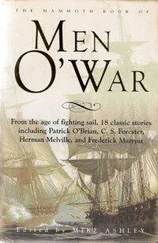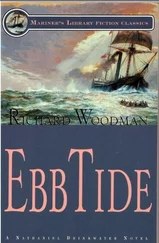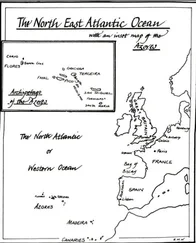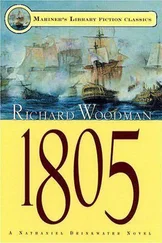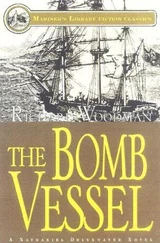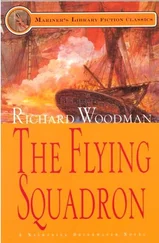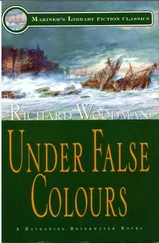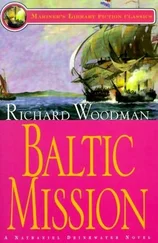Drinkwater suppressed a shudder at the mention of that fearful disease, but was unable to restrain his interest. 'And what is the news from Spain?'
'Wellington is across the Pyrenees,' Barrow declared, his eyes shining, 'he deceived Soult by crossing an "impassable" but shallow channel of the River Bidassoa. He entered France and forced the Nivelle in November, a month after Leipzig! I tell you, Captain, it is now only a matter of time.'
'And what of Marshal Murat?'
Barrow barked a short, derisive laugh. 'King Joachim has retired to Naples to raise troops, but is, in fact, in contact with the Austrians.' Barrow paused and smiled. 'So you see, Captain, we have not entirely lost the services of a Secret Department in your absence.'
There was a sleek complacency in Barrow's patronizing which irritated Drinkwater after the rigours of his short but violent voyage. Nor had the Second Secretary yet finished the catalogue of Allied triumphs.
'And you will be interested to know that King Joachim', Barrow pronounced the title with sonorous irony, 'has not only concluded a treaty with Vienna, but also one with His Majesty's government, as recently as last week.'
'I see. Colonel Bardolini would have been pleased.'
'Bardolini?' Barrow frowned. 'Oh, yes, I recollect; the Neapolitan envoy. Well, at all events, Captain Drinkwater, the Board are most gratified with the success of your cruise, and not displeased that you have enjoyed a measure of personal success.'
'That is very civil of the Board, Mr Barrow.' Drinkwater bestirred himself; much had happened in his absence. 'Please be so kind as to convey my thanks to Lord Melville and their Lordships.'
Barrow inclined his head. 'Of course.'
Drinkwater rose and reached for his hat. The inferred message in Barrow's complimentary speech was less subtle than Barrow imagined. Drinkwater was not to expect a knighthood for taking the Odin ; moreover, the Admiralty Board considered he should be satisfied with his prize-money. The gold was indeed a droit of Admiralty, having originated in Britain in the first place, as payment for wheat sent to Wellington's army in Spain two years earlier.
Drinkwater cleared his throat. 'I should like to ask for a dockyard post for Birkbeck, my sailing master, Mr Barrow, and a step for Mr Frey,' he said.
Barrow frowned. 'He is getting his percentage for carrying the specie as you requested in your report.'
'He is an excellent officer, Mr Barrow, a competent surveyor and first-rate water-colourist. Please don't forget', he added, with an edge to his voice, 'that several officers have died upon this service.'
Barrow opened his mouth, saw the harshness in the eyes of the sea-officer before him and cleared his throat. 'Frey, d'you say?' He made a note of the name. 'Then perhaps I might find something for him.'
'I should be obliged.' Drinkwater was satisfied, unaware of the effect his expression had had on Barrow. His time at the Admiralty had not been entirely wasted. He would not otherwise have known of Barrow's predilection for exploration. 'Good-day to you.'
'Good-day.' Drinkwater had reached the door when Barrow called after him, 'Oh, by the way, what happened to that clerk Templeton? I did not see his name among the dead or wounded.'
'He is well,' Drinkwater replied, adding evasively, 'he has taken furlough.'
'He has lodgings off the Strand, if I recall aright. Lived there with his mother in some decayed style, I believe.'
'Indeed.'
Drinkwater did not wish to pursue the matter and was in the act of passing through the door when Barrow went on, 'You may tell him there is still a place for him in the copy room. We still need a good cipher clerk — though not so often now.'
'I will tell him,' replied Drinkwater, 'though I am not certain he wishes to return to the copy room.'
'Very well. That is his affair. Good-day to you, Captain.' 'Good-day.'
Drinkwater walked down Whitehall towards the Abbey. He was deeply depressed, for Templeton was no guest of his, but had been held at the house in Lord North Street against his will under the close guard of Mr Frey.
The fate of Mr Templeton had been the last strand in the splice. And, ironically, he had been the means by which the rope's end had come unravelled in the first place, with his news of Bardolini's arrival at Harwich. And, Drinkwater thought savagely, pursuing his nautical metaphor, the last strand had been the most difficult to tuck.
He had attended to all the incidental details of the affair. He had buried Quilhampton as he had buried Huke, along with all the dead that had not been unceremoniously hurled overboard during the action fought with the Odin , sending their weighted bodies to the deep bed of the Vikkenfiord as he read the burial service, culminating with the psalm, 'I will lift up mine eyes unto the hills: from whence cometh my help ...'
The cold and distant mountain summits had mocked him in his grief.
And he had dutifully written to Mosse's father, and to Huke's sister and asked permission to wait upon her and her mother; he had discharged into the hands of the military the American prisoners who had been Malaburn's confederates. They, in due process, would be returned to Dartmoor gaol.
And still there was Templeton.
The vague unease which Drinkwater had felt towards his confidential clerk had, he now knew, been founded on half-realized facts and circumstantial evidence that the preoccupations of those desperate days in the Vikkenfiord had driven from his immediate consideration.
When, however, the light northerly winds persisted and promised them a cold but steady southward passage, Drinkwater had had more leisure to mull over the events of recent weeks. The high pressure of the polar regions extended the length of the North Sea, bringing to England a bitter, snow-girt Christmas and to London the novelty of a frozen Thames.
Ice settled, too, about Drinkwater's heart.
He had wondered who had murdered Bardolini, attributing the crime to one of the many spies Napoleon maintained in London, as he had suggested to Castlereagh's under-secretary, but the cunning and co-ordination of Malaburn's actions, the appearance, compliance and ready impressment of those Americans, the sabotaged gun breeching, the certainties inherent in Malaburn's conduct in that last, fatal encounter, all argued something more sinister, more organized. He became obsessed with the notion of a conspiracy.
Drinkwater could not evade the question of what he would have done had Banks not so peremptorily shot Malaburn. With Huke dead, Malaburn had overplayed his hand, but with Huke still alive, Drinkwater did not truly know what he might have done.
These events, isolated in themselves, were but elements in the desolation of the last weeks. Their linkage was circumstantial, no more part of a conspiracy, in fact, than Herr Liepmann's report of a quantity of arms arriving at Hamburg. And yet, for so fatalistic a man as Nathaniel Drinkwater, the train of isolated occurrences wanted only a catalyst to link them as certainly as Bardolini's intelligence had led Andromeda to the American privateers anchored in the Vikkenfiord.
Two days south from Utsira, Mr Birkbeck had placed the catalyst in his hand.
'I'm afraid I opened it, sir. I had no idea what it was, but I think you should see it.'
Drinkwater knew what it was the instant he saw the package in Birkbeck's grasp. It had been in his office at the Admiralty, then in the house in Lord North Street. Now...
'Where did you find it, Mr Birkbeck?' he had asked quietly.
'In the hold, sir.'
'Malaburn.'
'It has an Admiralty seal...'
'Yes, yes, I'm much obliged to you.' Birkbeck had relinquished the canvas parcel and retreated, his curiosity unsated.
Читать дальше
